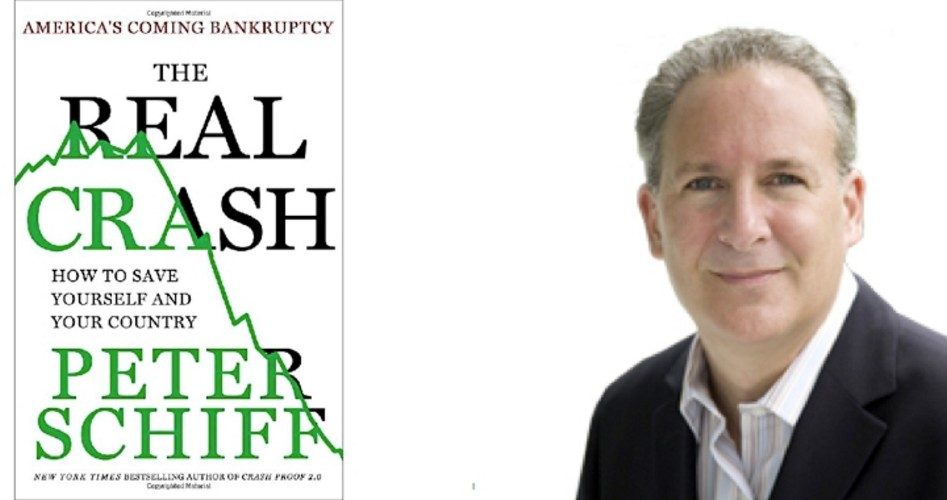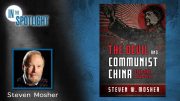
The Real Crash: Americans Coming Bankruptcy -— How to Save Yourself and Your Country by Peter D. Schiff, (New York: St. Martin’s Press, 2012), 335 pages.
The Real Crash is a treasure trove of economic wisdom and policy proposals that will — unfortunately — not be followed by policy makers in Washington without a complete political revolution of returning the U.S. government to its constitutional limits. Author Peter Schiff (pictured next to his book at left) has a dire prediction for America’s future: “Think of the austerity measures in bankrupt countries like Greece — that’s where we’re headed,” Schiff warns. Schiff expects higher taxes and ultimately a national bankruptcy similar to that facing Greece — and will soon face the other European PIIGS countries (Portugal, Italy, Ireland and Spain).
For the coming economic crash, Schiff, President of Euro-Pacific Capital, has a policy recommendation that is the lesser of two evils: “It’s time for the United States of America to declare bankruptcy.” And he says that the longer the United States government waits to declare a restructuring of its unmanageable debt, the worse the economic crash will be. “We are already bankrupt, it’s time we declared it. The U.S.A. is insolvent, and should enter the sovereign equivalent of Chapter 11 bankruptcy.”
If that sounds drastic at a time when Treasury bills are selling on the open market for almost zero interest, The Real Crash will serve as a wake-up call about what’s coming. Cheap finance of U.S. government debt cannot last forever, Schiff points out. Interest rates must rise eventually, and the federal government’s interest finance costs — already more than $450 billion per year — will eventually go up by several multiples and increase the deficit further. Schiff correctly labels the national debt “the mother-of-all adjustable-rate mortgages.”
Schiff notes that this will have an immediate impact on the U.S. budget, explaining that “given the short maturity of our debt, it’s very possible that in any given year, over $5 trillion in debts will mature.” That’s a figure, Schiff reminds the reader, more than twice federal revenue in any given year.
Inflating the currency will not help in the long run either. Eventually “no private buyers will purchase corporate or municipal bonds at rates far below the official inflation rate. This is when its balance sheet really explodes.” And so would interest financing of the debt. “Given a choice between the two,” inflation and a national debt restructuring that would technically be a default, “default is by far the better choice, even for our creditors.”
Some might be quick to dismiss Schiff’s dire predictions of looming unemployment levels rising to Great Depression levels or worse, but they would do so at their own peril. Few have the bona fides that Schiff has in making economic predictions, predicting both the NASDAQ and the housing bubbles of the last two decades years before they burst. And unlike most prognosticators of economic doom, Schiff explained in detail why both crashes happened.
Schiff was one of the few (though among a majority of Austrian school economists) who pointed to government intervention as the cause of the bubble, including Federal Reserve suppression of interest rates, elimination of mortgage risk by government-sponsored enterprises such as Fannie Mae, Freddie Mac, and the Federal Home Loan Bank, and regulations under the Community Reinvestment Act. Yet the government causes of the recession are still widely unknown and blamed on the “greed” of Wall Street firms, despite the lack of a rational explanation about why Wall Street would be on an even keel for decades and suddenly run off the rails with greed and corruption. But films blaming greed such as Inside Job and Michael Moore’s Capitalism: A Love Story have contributed to the mythology. Key among these films’ explanation for the crash is that the Glass-Steagall law in 1933 which created the FDIC had been weakened during the Clinton years. Schiff agrees that this change had an impact upon the crash, but was not the cause itself. “Glass-Steagall killed the market and replaced it with government regulation. Gramm-Leach-Bliley killed the government regulation, but didn’t replace it with anything.”
Most of the real costs of the crash of 2008-09 from the housing and financial bubble were covered over by a bigger bubble, the government debt and inflationary bubble. Schiff explains that “what they saw in 2008 and 2009 wasn’t the crash – that was a tremor before the earthquake. The real crash is still coming.” The real crash, Schiff predicts “will probably be as bad, or worse, than the Great Depression. You’d better be ready for it.”
The economy is keeping on an apparent even keel today because of the “twin bubbles in the U.S. Dollar and Treasury bills and bonds are providing a similar prop,” props that cannot be sustained. The national debt is now $140,000 for every household in America, and increasing at a rate of $10,000 per family per year. This does not include state and local government debt, consumer debt or even promises made in entitlements. Adding these promises in to the total, Schiff arrives at a total debt of $100 trillion.
And whose fault is the coming crash? It’s the peoples’ own government. “The government was the chief architect of the mess we’re in, and every day, government is making it worse.” Even leftists implicitly recognize this, blaming the “great recession” on the Bush administration. And indeed, the Bush administration did its best to amplify the housing and financial bubble. Leftists believe that a wiser government under a Democratic President such as Obama will bring a different result, even though Obama and a compliant Congress have only accelerated further the same actions of the Bush administration and the Congress during his administration.
“This political aversion to austerity has set us up for an even bigger crash,” Schiff concludes. Indeed, the definition of “austerity” no longer means living within your means and balancing your budget. Greece has supposedly endured years of “austerity,” but never came close to balancing its national budget or making the cuts needed for creating a sustainable economy.
Schiff’s prescription for America: “We need to stop bailouts, government spending, government borrowing, and Federal Reserve manipulation of interest rates and debasement of the dollar.” A large part of the book is devoted to Schiff’s policy proposals, which include phasing out entitlements, lots of spending cuts and an end to anti-business regulations:
- Abolish the “hiring penalty,” the 15.3 percent Social Security tax, half of which is paid by an employer, in addition to unemployment insurance, health care mandates, anti-discrimination laws, and a variety of regulations from the Americans with Disabilities Act to repealing the minimum wage.
- Pass tort reform, from medical to “defensive investing,” and enact stronger “loser pays” rules.
- End bailouts, including the FDIC, Fannie Mae and Freddie Mac, even if it takes a constitutional amendment banning bailouts of private institutions.
- Return to the gold standard for the dollar.
- Abolish the income tax, payroll (Social Security FICA tax), estate and gift taxes, replacing them with user fees, excise taxes and flat tariffs (even, temporarily, a national sales tax).
- Phase out Social Security and Medicare by means testing the programs and increasing the retirement age commensurate with the increase in life expectancy.
- End all federal education assistance, including college loans and subsidies that are increasing the price of college, and abolish the Department of Education.
- Repeal Obamacare.
- Eliminate all foreign aid.
- Minding our own business in foreign affairs, bringing the troops home from foreign bases, and cutting the defense budget.
Sadly, the current makeup of Congress and the executive branch will not enact any of these sound proposals. In fact, Schiff correctly explains that there will be urgent cries to go the way of Greece, blaming capitalism and marches demanding higher taxes, more entitlements and bailouts. “When the bigger crash comes, the attacks on capitalism will become louder, and the proposed government interventions will become even more extreme.”
The book is rife with analogies that speak to the average reader, and is not merely a bunch of technical formulas. Politicians are “like a rehab counselor who won’t let the addict go through withdrawal.” A family that lives above its means for a time will eventually have to live beneath its means, Schiff explains, using the example of a shopkeeper in a town who “sees all his customers running up credit card debt.” Schiff concludes that “He’ll stop stocking the shelves as much, because he knows the day will come when his customers will max out their cards. Not only will the customers no longer be able to spend more than they earn, they won’t even be able to spend as much as they earn, because some of their income will go toward paying off debt, plus interest.” So it will be with the nation as a whole, he correctly concludes.
Schiff’s investment advice is hard for a patriotic American to hear. He calls for “shorting the U.S. government,” in part by shorting the dollar. One can do this by “buying physical gold, getting a diversified portfolio in dividend-paying global stocks and gold-mining stocks, and holding a good mix of strong foreign currencies like the Chinese RMB, the Swiss franc, the Canadian dollar and the Australian dollar.”
The book digresses from a traditional “how to get us out of this mess”-type of book about two-thirds of the way through where Schiff opines about a variety of social issues (immigration, prostitution, drugs, the Second Amendment, abortion, etc.) that do not address the fiscal consequences the nation faces. In that capacity, Schiff reveals himself as libertarian on most issues and not on a few others.
It’s here that Schiff’s proposals may chafe with some constitutionalists. For example, Schiff opposes complete abolition of the Federal Reserve Bank. He wants it neutered, but a “banker’s bank” still has its uses, he believes, even if on a much more limited charter. “For practical reasons, we should preserve an independent central bank that provides a single currency” because “imagine if the treasury controlled the money supply. Or even worse, if Congress did.” Of course, when Congress actually controlled the money supply under the gold standard from 1836 to 1913, and the currency was far more stable at that time than under the Federal Reserve today.
Schiff also favors vouchers for public schools (though from local governments only) as an imperfect compromise in a field of impolitic choices unlikely to abolish government funding of education outright. But such funding would inevitably be used to impose government educational restrictions on church schools, perhaps after a television expose on how some Muslim families used the government vouchers to create a madrasah (Islamic school) that taught some politically unfavorable form of the religion.
Schiff also gives a nod to his father, famed income tax protester Irwin Schiff, who is currently serving prison time for his third conviction not paying income taxes. Citing the Supreme Court case of Brushaber v. Union Pacific Railroad (1916), the younger Schiff claims that “the Sixteenth Amendment did not overturn the Pollock decision, nor did it allow the government to levy an unapportioned direct tax on income.” In point of fact, the Brushaber court did uphold an unapportioned income tax, while (unbelievably) claiming that a tax on a man’s income was in reality an indirect tax. The income tax protest movement — which has a noble goal of abolishing the income tax — has long argued that wages are not income because they are not profit, but are instead an exchange of services of equal value. But the IRS has never accepted this caricature, nor has any court.
These digressions are minor speed bumps in an otherwise invaluable text that every informed citizen should read, however.
“Right now,” Schiff concludes of America’s choices regarding bankruptcy or continuing current policies, “we’re in a car, out of control, speeding down an icy hill. Our politicians pretend they’re in control, and so we keep accelerating toward the bottom. We need a grown-up to grab the wheel and steer us into the ditch on the side of the road. That won’t be pretty, but it’s better to go into the ditch at 80 miles an hour than crash into a brick wall at the bottom of the hill at 120.”
Americans ignore the valuable insights of Peter Schiff at their own peril.



